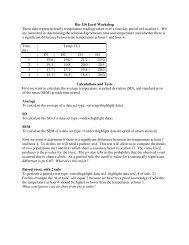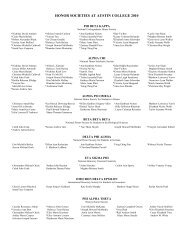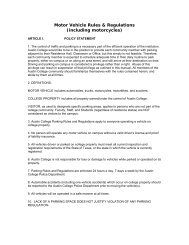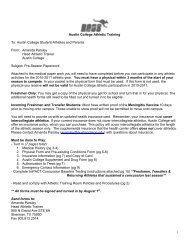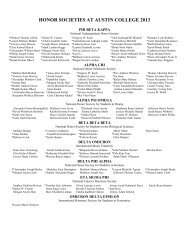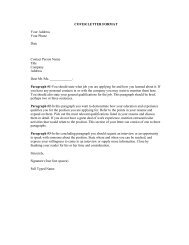Create successful ePaper yourself
Turn your PDF publications into a flip-book with our unique Google optimized e-Paper software.
BIOLOGYmay apply toward the major. Some ofthe courses listed below may not beoffered in a given year.The following courses are recommendedfor biology majors: Chemistry 221,222, 351, 352; Mathematics 151; SocialScience 120 or Mathematics 120;Physics 105, 106.A minor in biology consists of a minimumof five course credit units includingBiology 115 and 116, and at leastone course from each of the two categories,Molecular, Physiological, and StructuralBiology and Organismal, Ecological,and Evolutionary Biology. One of thefive courses must be at the 300-level orabove. Chemistry 351 or an environmentalstudies course approved by the BiologyDepartment may substitute for one ofthe five biology courses.Organismal, Ecological,and Evolutionary BiologyAnimal BehaviorEcologyEcosystem EcologyEvolutionary BiologyOrnithologyPlant BiologyVertebrate BiologyMolecular, Physiological,and Structural BiologyAnatomy and PhysiologyBiotechnologyCellular PhysiologyComparative Vertebrate AnatomyDevelopmental BiologyEukaryotic PathogensGeneticsHistologyHuman Infectious DiseasesImmunologyMicrobiologyMolecular BiologyNeurobiologySystemic PhysiologyBiology majors and minors must takeall biology courses in the major orminor for a grade (A/F). The exceptionsto this policy are Research Experience( Biology 240) and Teaching/LearningParticipation ( Biology 464), which areonly graded S/D/U; Directed Study( Biology 260 and 460) and IndependentStudy ( Biology 490 or 491) may be takenS/D/U at the instructor’s discretion.101 Contemporary Topics in BiologyIntroductory courses intended for the generalaudience that do not count as prerequisites forother courses in biology or satisfy requirementsfor the major in biology. These courses introducestudents to the process and product of scientificinquiry, and to ways that knowledge ofbiology affects our lives. Title and emphasisannounced in term schedule of courses. Pasttopics have included human genetics, emergingand re-emerging diseases, and biology forcitizens. These courses include a laboratorycomponent. May be repeated when topic varies.(Usually each year)115 Evolution, Behavior, and EcologyProvides a conceptual framework for furtherstudy in biology through an introduction toevolution, behavior, and ecology. Topics includethe mechanisms and results of evolution;speciation processes; population, community,and ecosystem ecology; fundamentals of animalbehavior; and behavioral ecology. (Each fall)116 Cell BiologyProvides a theoretical and experimental foundationfor further study in biology. This coursefocuses on a detailed analysis of structure andfunction of macromolecules characteristic ofvarious cell types, and on information transferin living systems at the molecular level. Prerequisite:Biology 115 or permission of instructor.(Each spring)234 Anatomy and PhysiologyAn introduction to the study of vertebrateanatomy and physiology. This course exploresvarious systems of the human body with anappropriate balance and integration betweenthe two disciplines. Prerequisite: Biology 116or permission of instructor. (Each fall)240 Research experience(Variable course credit)Participation in biological research. Students areinvited to work with faculty on some componentof their research program. Students’ responsibilitiesare established through a learning contract.78 |COURSES OF INSTRUCTION




